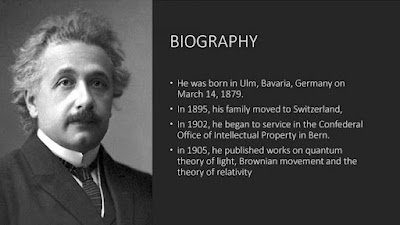Albert Einstein was a theoretical physicist, also considered as one of the most influential physicists of the 20th century. He developed the theory of relativity, one of the two pillars of modern physics, also known for its influence on the philosophy of science. He is best known for his mass–energy equivalence formula E = mc2, which has been dubbed as “the world’s most famous equation“.
Biography of Albert Einstein
Albert Einstein was born on 14 March 1879 in at Ulm, in Württemberg, Germany. Six weeks later the family moved to Munich, where he later on started his schooling at the Luitpold Gymnasium. Later, they moved to Italy and Albert continued his study in Aarau, Switzerland, and in 1896 joined the Swiss Federal Polytechnic School in Zurich to be trained as a physics and mathematics teacher.
In 1901, he obtained his diploma, and accepted Swiss citizenship. In 1905, he obtained his PhD degree from the University of Zurich. he was unable to find a teaching post, therefore, he accepted a position as technical assistant in the Swiss Patent Office. During his stay in the Patent Office, in his spare time, he created many outstanding works and was appointed Privatdozent in Berne in 1908. He taught theoretical physics at Zurich between 1912 and 1914.
In 1914 he was appointed director of the Physical Institute of Kaiser Wilhelm and professor of the University of Berlin.
He became a German citizen in 1914 and remained in Berlin until 1933 when he gave up his citizenship for political reasons and moved to the United States to take the position of professor of theoretical physics at Princeton University.
He won the Nobel Prize in physics for his explanation of the photoelectric effect in 1921. One year later, again he received Nobel Price in 1922.
In the following decade, he moved to the U. S. soon being targeted by the Nazis. His work also had a huge impact on the development of atomic energy. In his later years, Einstein gave focus on unified field theory. With his passion for inquiry, Einstein is widely regarded as the most influential physicist of the 20th century.
In 1933, when Einstein was visiting the United States, Adolf Hitler came to power. Due to his Jewish background, Einstein did not return to Germany, settled in America, became a US citizen in 1940 and retired from his post in 1945.
On the eve of World War II, he endorsed a letter to President Franklin D. Roosevelt. He warned him of the possible development of ‘extremely powerful new-type bombs’ and recommends that the US begin similar research. This eventually led to the Manhattan project. Einstein supported the allies, but he generally condemned the idea of nuclear fission as a weapon.
After World War II, Einstein was a leading figure in the World Government movement. He was offered the Presidency of the State of Israel, which he refused, and he accompanied Dr. Chaim Weizmann work to establish the Hebrew University of Jerusalem.
He spent his last 25 years of life at Princeton University where he died on 18 April, 1955.

Comments
Post a Comment